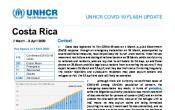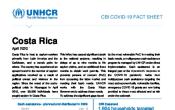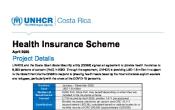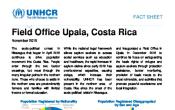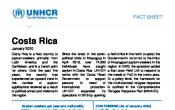Costa Rica
Operation: Costa Rica
Location
{"longitude":-84,"latitude":10,"zoom_level":7,"iso_codes":"'CRI'"}
By clicking on the icons on the map, additional information is displayed.
The boundaries and names shown and the designations used on this map do not imply official endorsement or acceptance by the United Nations.
Key Figures
| 2020 planning figures | |
| 100% | of people of concern will have access to status determination procedure |
| 75% | of people of concern will have formal access to work opportunities |
| 60% | of people of concern will have access to legal orientation or counseling |
| 2,000 | refugee households will receive cash grants |
| 2017 year-end results | |
| 1,380 | newly arrived asylum-seekers were provided with legal assistance |
| 1,110 | families (2,310 people) received cash-based assistance |
| 1,040 | people of concern were assisted with late birth registration procedures |
| 170 | people of concern were provided with psychological individual assistance, of whom 55 were SGBV survivor women |
| 130 | people of concern from the NCA with heightened protection risks benefited from the Protection Transfer Arrangement (PTA), an humanitarian evacuation programme |
Latest Updates and Related Links
People of Concern
207%
Increase in
2019
2019
| 2019 | 114,535 |
| 2018 | 37,287 |
| 2017 | 12,015 |

[["Refugees",6217],["Asylum-seekers",87190],["Stateless",231],["Others of concern",69],["Venezuelans displaced abroad",20828]]
Loading ...
Costa Rica
< Back
2019
{"categories":[2015,2016,2017,2018,2019,2020],"budget":[3.028757242,4.77087632,6.46405512,12.08599401,24.005906475,26.85230847],"expenditure":[2.50565576,3.45812078,4.33992142,8.33893744,13.7118151,null]}
{"categories":[2015,2016,2017,2018,2019,2020],"p1":[3.028757242,4.52223732,6.05407202,12.08599401,24.005906475,26.85230847],"p2":[null,0.248639,0.4099831,null,null,null],"p3":[null,null,null,null,null,null],"p4":[null,null,null,null,null,null]}
{"categories":[2015,2016,2017,2018,2019,2020],"p1":[2.50565576,3.21075754,4.0048406,8.33893744,13.7118151,null],"p2":[null,0.24736324,0.33508082,null,null,null],"p3":[null,null,null,null,null,null],"p4":[null,null,null,null,null,null]}
Loading ...
CHOOSE A YEAR
- 2015
- 2016
- 2017
- 2018
- 2019
- 2020
Year-end Overview
Plan Overview
Operational Environment
Costa Rica has increasingly become a major asylum destination and transit country for the main refugee situations and people in mixed movements in the Americas. Costa Rica is destination for refugees from Venezuela, the North of Central America, Colombia and most recently Nicaragua. It has also served as transit for Cubans, Haitians, African and Asian nationals going northwards. These growing trends are expected to continue in 2019 and beyond.As a multi-year multi-partner (MYMP) strategy and CRRF roll-out country, Costa Rica has played a leading strategic role in establishing a protection and integration space to respond to the regional refugee situations. Costa Rica has progressively reviewed its legal and policy framework on refugee protection to modify the the refugee status determination (RSD) system, include the principle of non-refoulement, safeguards on unlawful entry, and age, gender and diversity (AGD) approaches, as well as to provide asylum-seekers with the right to work after the third month of their asylum claim date. Protocols have been put in place to ensure protection of unaccompanied and separated children as well as survivors of sexual and gender-based violence, trafficking, and smuggling. Costa Rica’s Administrative Migration Tribunal offers asylum-seekers a second instance on appeal for rejected asylum claims.
Refugees and asylum-seekers in Costa Rica are of mixed socio-economic backgrounds, many of whom have special protection needs that require tailored local integration and assistance interventions.
The country’s legal framework allows asylum-seekers and refugees to access basic needs and services on equal footing as nationals, i.e. national welfare programmes that benefit vulnerable populations living in extreme poverty, access to public education, scholarships and job placement. Despite favorable legal and policy frameworks, Costa Rica continues to face economic challenges and undergoing fiscal reform. This situation could affect the capacity of the government to maintain a sustained response. International cooperation is of paramount importance.
Key Priorities
In 2019 UNHCR will focus on:- Maintaining Field Office in Upala in line with UNHCR´s protection by presence strategy to ensure admission to the territory, prevention from refoulement, effective access to RSD procedures and documentation.
- Providing capacity building support to the Migration Authority and the Administrative Migration Tribunal with the deployment of additional adjudicators, administrative staffing, and the leasing of new premises in San Jose.
- Strengthening the National Social Welfare Institute (IMAS)’s capacity to ensure eligible humanitarian assistance for people of concern.
- Strengthening cash-based interventions to complement other forms of humanitarian assistance to newly arrived eligible asylum-seekers.
- Strengthening livelihood activities nationwide, including vocational training and job placement activities for Nicaraguans.
